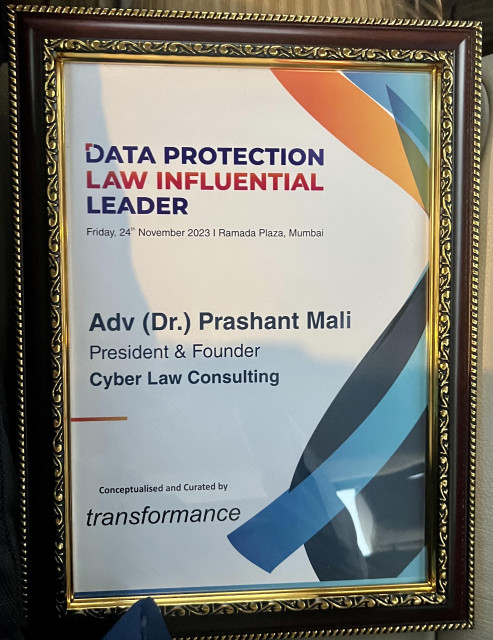 Data Protection Law Influential Leader
Data Protection Law Influential Leader
tranformance
November 24, 2023
Awarded as Data Protection Law Influential Leader at the Chief Data Officers conference and awards by transformance. This award was awarded recognizing my thought leadership in framing a framework of Data Protection Law in the country and handling real-life landmark Privacy and data breach cases
See publication
Tags: Leadership, Privacy
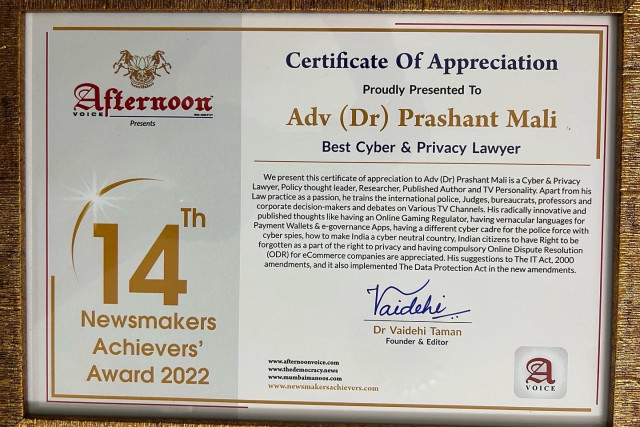 Best Cyber and Privacy Lawyer 2022
Best Cyber and Privacy Lawyer 2022
Newsmakers Achievers Awards NBC Awards
May 01, 2022
Best Cyber and Privacy Lawyer 2022 was awarded in 14th Newsmakers Achievers Award along with the police commissioner and mayor of Mumbai City. This was awarded recognising my two decades of work in the field of cyber and privacy law
See publication
Tags: Cybersecurity, Privacy
 National Cyber Defence Award
National Cyber Defence Award
Suryadutta Institutes
September 01, 2019
Advocate Prashant Mali, Cybersecurity expert was given National Cyber defence Award by the hands of Lt. Gen Shekatkar for his outstanding contributions in the field of Cyber defence and cyberwarfare
See publication
Tags: Cybersecurity, Legal and IP, Privacy
Chevening India Cybersecurity Fellowship
UK State Department
January 06, 2016
Chevening India Cyber Security Fellowship. The Chevening India Cyber Security Fellowship is aimed at mid-career professionals with demonstrable leadership potential in the field of cybersecurity or cyber policy in India. The fellowship is funded by the Foreign & Commonwealth Office. conducted at the Cranfield University campus inside of Defence Academy of UK
See publication
Tags: Cybersecurity, Privacy
Cyber law and Cybersecurity Lawyer of the year 2014
Indian National Bar Association
December 01, 2014
Adv. Prashant Mali only distinguished Cyber Security & Cyber Law Expert and A High Court Lawyer in the country to have Masters in Computer Science and Masters in Law with Certification in Computer Forensics & Information Systems Security Auditing with prior working experience in the field of Software, Networking & IT Security. He currently handles Landmark court cases in the History of The IT Act, 2000 and is a coveted Legal counsel for Electronic evidence, IT Act, 2000, IPR, Data Privacy, Frauds or Economic offences related arguments. He has more than 20 Yrs. of all-round IT & Law (Litigation &Consulting). He is the president of a law firm called Cyber Law Consulting based out of Mumbai.“Cyber Law & Cyber Security Lawyer of the year: 2014” award presented to Adv. Prashant Mali, Cyber & Security Law expert by Ms. Meenakshi Lekhi, Member of Parliament and National Spokesperson, Bharatiya Janta Party at INBA 65th National Law Day.
See publication
Tags: Cybersecurity, Privacy
India's Cyber Warfare Options Against Pakistan: A Strategic Analysis
International Journal For Multidisciplinary Research
April 30, 2025
This paper aims to provide a comprehensive analysis of India's potential cyber warfare strategies against Pakistan. It will delve into the critical infrastructure vulnerabilities within Pakistan, specifically focusing on its power generation and fuel stock sectors, which represent potential strategic targets. Furthermore, the analysis will consider the complex geopolitical context, including the nature and extent of external support that Pakistan receives from countries such as China, Iran, Turkey, and North Korea, as well as the influence of various non-state affiliated hacker groups. A crucial component of this paper is the examination of India's advanced technological capabilities in the cyber domain, including the rumored potential of the Kilo Ampere Linear Injector (KALI) and other electromagnetic pulse (EMP) weapons. Finally, the paper will address the significant strategic and ethical implications associated with India employing such cyber warfare tactics and will outline potential cyber warfare options that India might consider in its strategic calculus.
See publication
Tags: Cybersecurity, National Security, Security
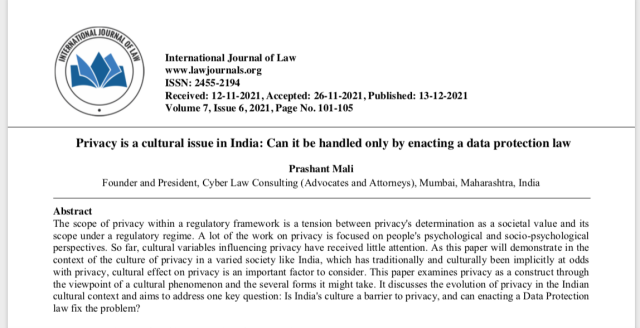 Privacy is a cultural issue in India: Can it be handled only by enacting a data protection law
Privacy is a cultural issue in India: Can it be handled only by enacting a data protection law
International Journal of Law
December 13, 2021
The scope of privacy within a regulatory framework is a tension between privacy's determination as a societal value and its scope under a regulatory regime. A lot of the work on privacy is focused on people's psychological and socio-psychological perspectives. So far, cultural variables influencing privacy have received little attention. As this paper will demonstrate in the context of the culture of privacy in a varied society like India, which has traditionally and culturally been implicitly at odds
with privacy, cultural effect on privacy is an important factor to consider. This paper examines privacy as a construct through
the viewpoint of a cultural phenomenon and the several forms it might take. It discusses the evolution of privacy in the Indian cultural context and aims to address one key question: Is India's culture a barrier to privacy, and can enacting a Data Protection law fix the problem?
See publication
Tags: Cybersecurity, Legal and IP, Privacy
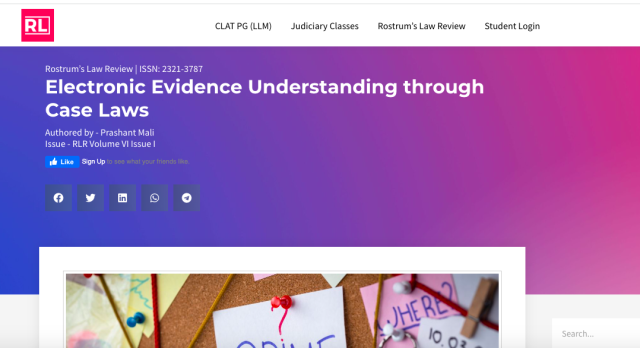 ELECTRONIC EVIDENCE UNDERSTANDING THROUGH CASE LAWS in India
ELECTRONIC EVIDENCE UNDERSTANDING THROUGH CASE LAWS in India
Rostrums Law Review
October 10, 2021
The use of electronic media for all purposes, legal and illegal has grown exponentially over the last decade. The situation is such that all legal tussles in the world today have some electronic data element involved. In many cases, electronic evidence is the best evidence available. Hence, it becomes crucial that such evidence is verified properly to make it reliable before the Courts of law. To add to the mix, electronic evidence is naturally very volatile. This makes its authenticity highly questionable since a lot of time passes between discovery and production before the court which makes it difficult to often press certain charges against the accused which would otherwise be straightforward.
This article examines the provisions relating to electronic evidence and its admissibility in Courts in India via case law. It also deals with the intricacies of electronic evidence, mandatory certification compliance and appreciation of electronic evidence.
See publication
Tags: Cybersecurity, DevOps, Legal and IP
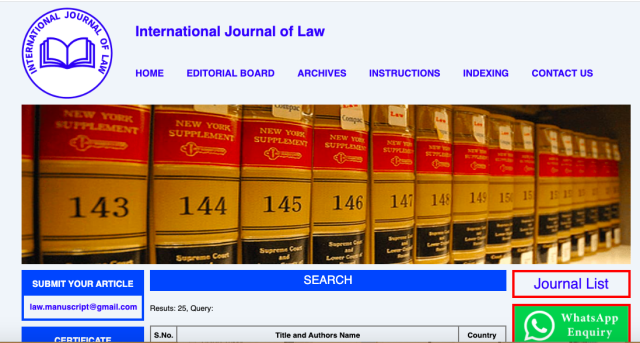 Consent in privacy laws: Analysis of India’s PDPB, ECPA of USA and GDPR of EU
Consent in privacy laws: Analysis of India’s PDPB, ECPA of USA and GDPR of EU
International Journal of Law
March 25, 2021
Consent refers to an affirmative action on the part of the individuals indicating their agreement to the use of their personal data by the collectors or processors for the purpose of processing. Consent has been viewed as an expression of a person‘s autonomy or control, which has the consequence of allowing another person to legally disclaim liability for acts, which have been consented to. Consent has many connotations in various privacy laws, somewhere it tows the line of prevailing international laws and in some laws it gets localized, but largely consent remains individuals’ will to share his / her data. This paper analysis the established privacy laws i.e. EU’s GDPR and ECPA of USA with long awaited India’s proposed Personal Data Protection Bill. The author has been involved in various government consultations on PDPB since 2006.
See publication
Tags: IT Leadership, Legal and IP, Privacy
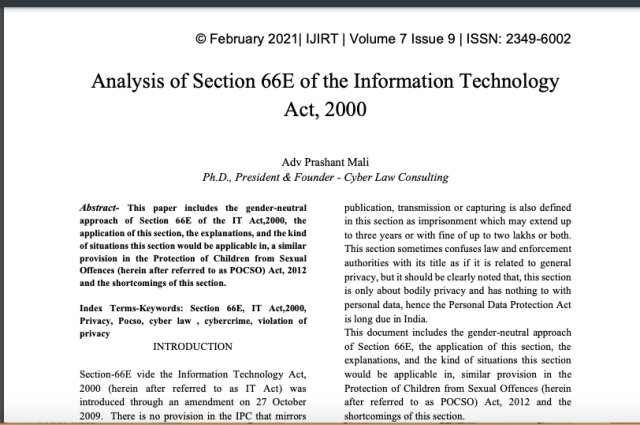 ANALYSIS OF SECTION 66E (Violation of Privacy in India) OF THE INFORMATION TECHNOLOGY ACT,2000
ANALYSIS OF SECTION 66E (Violation of Privacy in India) OF THE INFORMATION TECHNOLOGY ACT,2000
INTERNATIONAL JOURNAL OF INNOVATIVE RESEARCH IN TECHNOLOGY IJIRT
February 27, 2021
his paper includes the gender-neutral approach of Section 66E, the application of this section, the explanations, and the kind of situations this section would be applicable in, a similar provision in the Protection of Children from Sexual Offences (herein after referred to as POCSO) Act, 2012 and the shortcomings of this section.
See publication
Tags: IT Leadership, Legal and IP, Privacy
 DATA LOCALIZATION AND DATA PORTABILITY ANALYSED WITH INDIAN PDPB & GDPR (PRIVACY LAW)
DATA LOCALIZATION AND DATA PORTABILITY ANALYSED WITH INDIAN PDPB & GDPR (PRIVACY LAW)
International Journal of Creative Research Thoughts (IJCRT)
February 24, 2021
In the past five years’ Indian economy had witnessed a tremendous change with the introduction of ‘Digital India’ and increase in the use of digital economy post demonetization. Post Aadhar and privacy judgement (K.S. Puttaswamy and Anr Versus Union of India, 2017) in India, there was a need for the regularisation and a legal framework for data protection and its related aspects. It was in this context, that Justice B.N.Srikrishna Committee was set up to look into the issue of data privacy and protection. Based on the recommendations, the Parliament came out with the draft Personal Data Protection Bill,2018 on July 27, 2018. The bill came only a few weeks after the General Data Protection Act, 2018 enacted by European Union came into force. Given the fact that the scenarios and the history behind the enactment of both laws were different, there are similarities and dissimilarities. The paper will focus specifically on the aspect of data localisation and data portability with respect to both the laws. Keeping the two in mind, it will study whether the proposed legislation in India is disguised in nature with reference to the sovereign’s ultimate right over the data. It will also critically analyse GDPR’s stand on data localisation and its conflict with its member countries like Germany, France and Bulgaria.
See publication
Tags: International Relations, Legal and IP, Privacy
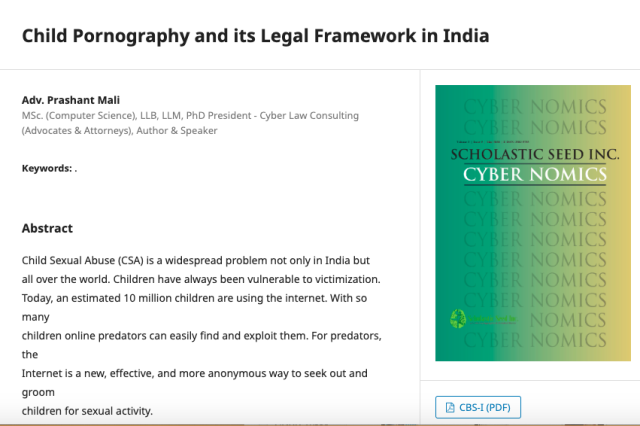 Child Pornography and its Legal Framework in India
Child Pornography and its Legal Framework in India
Cybernomics
May 19, 2020
Child Sexual Abuse (CSA) is a widespread problem not only in India but all over the world. Children have always been vulnerable to victimization. Today, an estimated 10 million children are using the internet. With so many children online predators can easily find and exploit them. For predators, the Internet is a new, effective, and more anonymous way to seek out and groom children for sexual activity. This paper talks about laws related to child pornography in India
See publication
Tags: Cybersecurity, Risk Management, Social
 Artificial Intelligence and Laws in India
Artificial Intelligence and Laws in India
Scholastic Seed Inc
December 30, 2019
Artificial intelligence, the definition from the OECD Principles: AI system: An AI system is a machine-based system that can, for a given set of human-defined objectives, make predictions, recommendations, or decisions influencing real or virtual environments. AI systems are designed to operate with varying levels of autonomy.
See publication
Tags: AI, Cybersecurity, Legal and IP
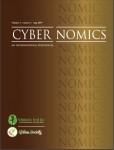 India needs Cyber Weapons and Policy
India needs Cyber Weapons and Policy
Cyber Nomics
November 30, 2019
Cyberweapons are stealth weapons. They don’t have the flash and bang of canons and missiles; they hit as in computer programs and are used to silently infiltrate individual machines and entire networks. They have the capacity to strike with great precision, shutting down critical infrastructure, confusing enemy signals, upending communications, and responding to and redirecting military attacks before they occur. Before India, ideally, the question is no longer: “Should we do this?” The question is now: “Can we do this?
See publication
Tags: Cybersecurity, Privacy
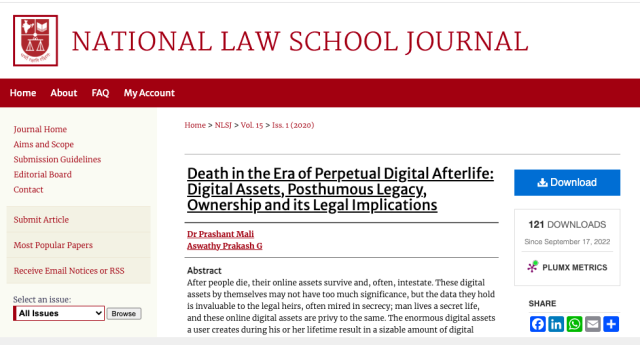 What happens to Google-Facebook-Instagram-Twitter After Death
What happens to Google-Facebook-Instagram-Twitter After Death
NATIONAL LAW SCHOOL JOURNAL
October 31, 2019
Man dies, but his online assets survive and, often, intestate. These digital assets by themselves may not have too much significance, but the data they hold is invaluable to the legal heirs, often mired in secrecy; man lives a secret life, and these online digital assets are privy to the same. The enormous digital assets a user creates during his or her lifetime result in a sizable amount of digital footprint posthumously. The consequence of all these cybernated dossiers is as unpredictable as the death itself, for there's no uniform practice of preservation, removal, and inheritance of these digital assets by the data handlers like social media platforms and other content hosting websites. Adding to this is the lack of proper definition and legal consensus as to what constitutes digital assets and how the deceased user's digital estate should be handled after his/her death. The objectives of this paper are to analyze the impact of death on digital assets and the association between unbequeathed online accounts and issues of identity theft and copyright violations of deceased user's accounts. This paper has adopted a doctrinal research method. The paper also broached the concerns about how these data should be managed in the best interests of legal heirs of the departed. The study shows that there's a lack of awareness among the netizens as to how to plan their digital estate while they are alive, and the personal laws of succession are also not drafted or revised foreseeing this new genre of assets.Man dies, but his online assets survive and, often, intestate. These digital assets by themselves may not have too much significance, but the data they hold is invaluable to the legal heirs, often mired in secrecy; man lives a secret life, and these online digital assets are privy to the same. The enormous digital assets a user creates during his or her lifetime result in a sizable amount of digital footprint posthumously. The consequence of all these cybernated dossiers is as unpredictable as the death itself, for there's no uniform practice of preservation, removal, and inheritance of these digital assets by the data handlers like social media platforms and other content hosting websites. Adding to this is the lack of proper definition and legal consensus as to what constitutes digital assets and how the deceased user's digital estate should be handled after his/her death. The objectives of this paper are to analyze the impact of death on digital assets and the association between unbequeathed online accounts and issues of identity theft and copyright violations of deceased user's accounts. This paper has adopted a doctrinal research method. The paper also broached the concerns about how these data should be managed in the best interests of legal heirs of the departed. The study shows that there's a lack of awareness among the netizens as to how to plan their digital estate while they are alive, and the personal laws of succession are also not drafted or revised foreseeing this new genre of assets.
See publication
Tags: Big Data, Legal and IP, Privacy
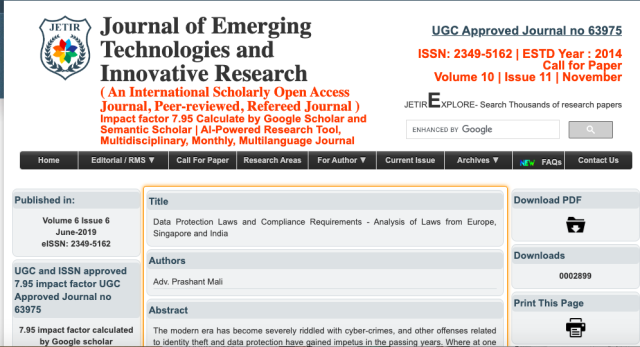 Data Protection Laws and Compliance Requirements - Analysis of Laws from Europe, Singapore and India
Data Protection Laws and Compliance Requirements - Analysis of Laws from Europe, Singapore and India
Journal of emerging Technologies and innovative research
June 10, 2019
The modern era has become severely riddled with cyber-crimes, and other offenses related to identity theft and data protection have gained impetus in the passing years. Where on the one hand, data-related tasks have become indispensable for our day-to-day transactions, the integration of communications and transfer of data and online transactions has increased the risk of these incidents of crimes happening manifold as compared to the erstwhile offline work. Reacting to the need, several countries have enacted their own versions of their respective data protection regulations, with the aim of enforcing stringent compliance
See publication
Tags: Cybersecurity, Legal and IP, Privacy
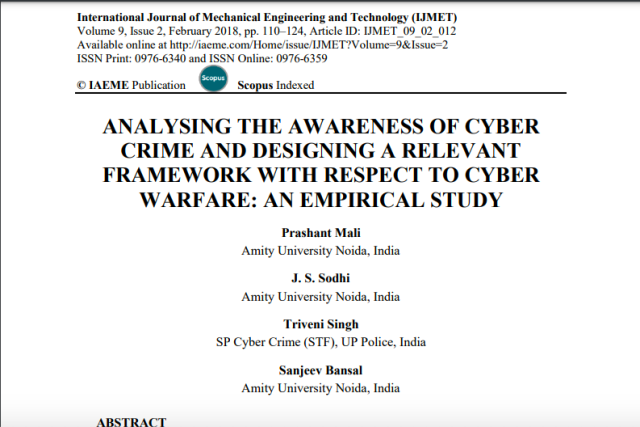 Privacy Law: Right to be Forgotten in India
Privacy Law: Right to be Forgotten in India
NLSIU LAW review
July 20, 2018
The “right to be forgotten” reflects the claim of an individual to have certain data deleted so that third persons can no longer trace them. The right to be forgotten was recognized for the first time in India through the judgment delivered by Karnataka High Court in the matter of Sri Vasunathan v. The Registrar-General in 2017. However, it has long been recognised in the EU jurisdiction. This article traces this development and discusses the legal implications of this right with the introduction of artificial intelligence. It finally concludes by discussing the right to be forgotten in India and how it has been merged with the right to privacy.
See publication
Tags: Legal and IP, Privacy, Social
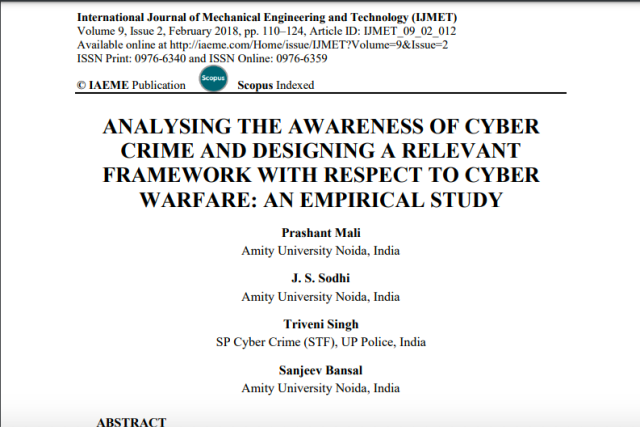 ANALYSING THE AWARENESS OF CYBER CRIME AND DESIGNING A RELEVANT FRAMEWORK WITH RESPECT TO CYBER WARFARE: AN EMPIRICAL STUDY
ANALYSING THE AWARENESS OF CYBER CRIME AND DESIGNING A RELEVANT FRAMEWORK WITH RESPECT TO CYBER WARFARE: AN EMPIRICAL STUDY
International Journal of Mechanical Engineering and Technology (IJMET)
February 01, 2018
Internet users are progressively getting themselves vulnerable to security dangers
amid their utilization of the internet. Therefore, the concern can be raised about users' awareness of these issues, and the degree to which they are thus secured and prepared
to manage situations they may experience. This paper has provided a survey of
contemporary thought on the challenges presented by cybercrime. It began by looking
at existing definitions of cybercrime and cyberwarfare and found two problems that
needed resolving. Firstly, it was found that there is no widely accepted definition of
either cybercrime or cyber warfare. This is problematic since, without an agreed
definition, it is dif icult to discuss the deeper issues or even recognize when cyber
warfare is occurring. It presents outcomes from the study of 325 users to evaluate
their view of security issues, their awareness and their dispositions towards the
utilization of related software. The findings uncover that in spite of the fact that there
is a high level of confidence at a surface level, with respondents asserting to know
about the dangers and using a large number of the important protections, more
thorough interpretation proposes that there are a few regions in which essential
information and comprehension are inadequate. Even though a large portion of the
issues was typically intense among fledgeling users, there was additionally
outstanding ignorance among users who viewed themselves to have propelled levels of
internet knowledge.
See publication
Tags: Cybersecurity, EdTech, Legal and IP
PRIVACY REGULATORY AND LEGAL FRAMEWORK IN INDIA
International Journal of Law and Policy Review
January 11, 2018
Privacy has been a sensitive question lurking over the head of Indian
administrators who have been equally reluctant and ignorant about
answering the same. The advent of Aadhaar Act in 2016 and
Government’s mandate of linking Aadhaar with PAN had mooted up
the issue of Privacy once again. Article 21 of the Constitution
provides privacy to the citizens but only to a limited extent, which was
put to question in several instances. The entire nation anticipates the
decision of the Aadhaar Case. The judgment in the case of Justice
Puttaswamy is famously known as the Privacy Case finally arrived on
24th August 2017, which will directly impact several cases of Aadhaar
pending before the Supreme court. Meanwhile, the Legislators have
kept a blind eye to the long-awaited Privacy Protection Bill of 2011.
While concern over Individuals Privacy continued to vacillate until
recently, the judgment has clarified situations to a large extent. Other
sectors such as banking and welfare have brought forth their own
rules to regulate Privacy concern. The article discusses the present
the legal situation of Privacy under various legislations, the impact of
recent privacy judgment in India and analyses whether the current
regulations created by various authorities such as SEBI, RBI, IRDAI
have something substantial to offer or are just there to mellow down
the daunting public.
See publication
Tags: Privacy, Legal and IP
Defining Cyber Weapon in Context of Technology and Law
International Journal of Cyber Warfare and Terrorism (IJCWT)
January 01, 2018
This article describes how the interconnected world of today, or the cyber space so often called, is easily accessible through a wide array of devices and has an impact and reach beyond geo-political boundaries Owing to high levels of connectivity and the nature of E-governance activities today, the cyber space is rapidly becoming a potential global battlefield for cyber warfare among various state and non-state entities. An effective cyber weapon in this space is like an indicator of cyber power, its nature being offensive or defensive. Parameters of effectiveness and reliability range from the type of developer of the weapon, whether state or non-state to its longevity in time and technology and others like possibility of an economic implementation along with the scope of its usage. This article is aimed at analyzing existing definitions, opinions and notions about cyber weapons and defining the term cyber weapon from a techno-legal perspective, which could be universally acceptable and have characteristics of enforceability across all domains: civil, criminal & defense applications.
See publication
Tags: Cybersecurity
 AI and Cybersecurity
AI and Cybersecurity
Economic Times
June 27, 2024
I will be speaking as a keynote on AI and cybersecurity in one of the Indias biggest cybersecurity conference
See publication
Tags: AI, Cybersecurity, Generative AI
 AI and Regulations in India
AI and Regulations in India
ISACA Mumbai Chapter Annual Conference
June 22, 2024
I will be speaking as a keynote on AI and Regulations in the annual conference of ISACA Mumbai chapter
See publication
Tags: AI, Cybersecurity, Generative AI
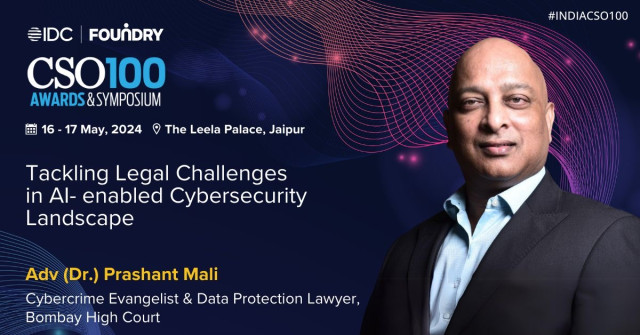 Tackling Legal Challenges in Al- enabled Cybersecurity Landscape
Tackling Legal Challenges in Al- enabled Cybersecurity Landscape
IDC Foundary
May 17, 2024
my keynote speech at IDG annual symposium of CISO at Jaipur, India on Tackling Legal Challenges in Al- enabled Cybersecurity
Landscape
See publication
Tags: AI, Cybersecurity, Generative AI
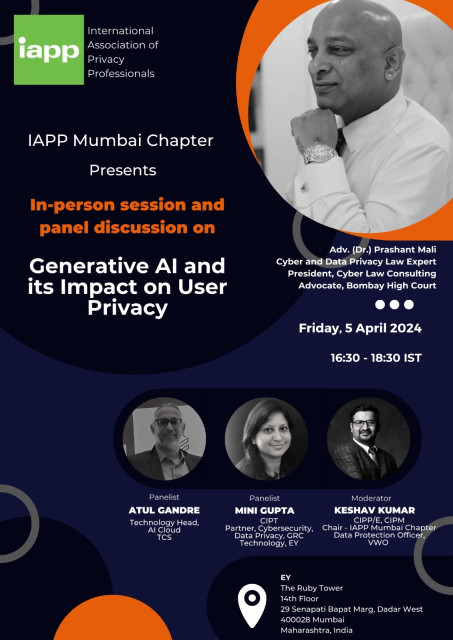 Generative Al and its Impact on User Privacy
Generative Al and its Impact on User Privacy
International Association of Privacy Professionals (IAPP) Mumbai Chapter
April 05, 2024
My keynote speech at The IAPP Mumbai Chapter on Generative Al and its Impact on User Privacy
See publication
Tags: AI, Generative AI, Privacy
Regulating and Governing OTT's, Web Series and Online Games
Limitless
May 14, 2019
Prashant Malis Keynote speech at Mumbai in a conference co-organised by CINTAA and Limitless. He Spoke on Laws and Regulations required for OTT's, Web Series and Online Games. He also spoke on laws for content creators and the position of IPR i.e. copyright in film, TV & Web series industry
See publication
Tags: Cybersecurity, Privacy
IBA Secure Banking in a Digital Era
Indian Banking Association
September 15, 2018
I spoke about the increased responsibilities towards cybersecurity of CISO in banks. How CISO can quickly become part of international investigations if there banking network is compromised. This opening address keynote was before 300 CISO's of Banks as this conference was organised by Indian Banking Association which is the Apex organisation of Bankers
See publication
Tags: Cybersecurity, Privacy
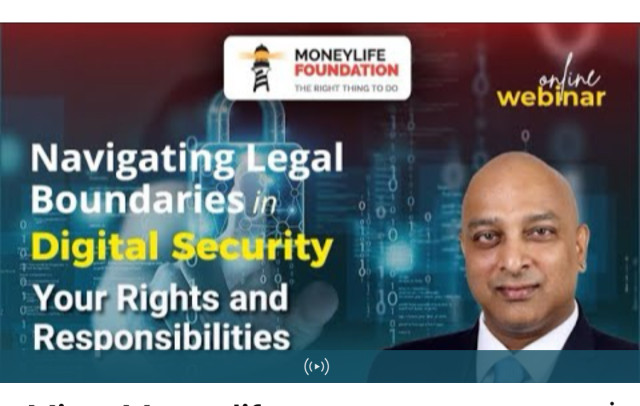 Navigating Legal Boundaries in Digital Security: Your Rights and Responsibilities
Navigating Legal Boundaries in Digital Security: Your Rights and Responsibilities
Moneylife Magazine
October 19, 2023
money life magazine interview with Adv Prashant Mali, renowned International Cyber & Privacy Lawyer, takes the time to explain the importance of cybersecurity and one’s legal rights and responsibilities in matters of digital security.
See publication
Tags: Cybersecurity, Privacy
Advocate Prashant Mali, Expert in Cyber Security in India at 10th WIITF 2019
VARINDIA Magazine
March 18, 2019
Advocate Prashant Mali, Expert in Cyber Security in India at 10th WIITF 2019
See publication
Tags: Cybersecurity, Legal and IP, Privacy
 Interview of Famous Cyber Law Expert Adv. Prashant Mali.
Interview of Famous Cyber Law Expert Adv. Prashant Mali.
Indian Legal Solution
January 22, 2019
Indian Legal Solution has taken my interview on my career
See publication
Tags: Cybersecurity, Legal and IP
 CXO Today's Interaction With Advocate Prashant Mali
CXO Today's Interaction With Advocate Prashant Mali
CXOTodayVideos
January 24, 2017
In an exclusive interaction with CXO Today, Prashant Mali, President Of Cyber Law Consulting (Advocates & Attorneys) Gives Crucial Recommendations For The Proposed Amendments In The IT Act 2000.
See publication
Tags: Cybersecurity, Legal and IP
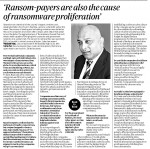 Ransom-payers are also the cause of ransomware proliferation
Ransom-payers are also the cause of ransomware proliferation
Business Standard
January 07, 2017
operations at a terminal of the country’s largest container port, Jawaharlal Nehru Port Trust in Mumbai, came to a standstill earlier this week. The process of loading and unloading containers was halted as the port’s computers shut down after a major cyberattack that swept across the globe.
The aggressiveness of the malware showed that such attacks were capable of bringing both corporate and government networks to a sudden halt. The ransom to retrieve files was reported $300, to be paid in virtual currency bitcoins.
See publication
Tags: Cybersecurity, Privacy, Risk Management
India must have a National Defence Academy for cyberwarfare
DataQuest Magazine
August 01, 2015
How prepared is India for a cyber war? Can a PPP model help? What are the steps India must take to secure itself? Noted lawyer and cyber security expert, Advocate Prashant Mali shares his perspective
See publication
Tags: Cybersecurity, Innovation, Legal and IP
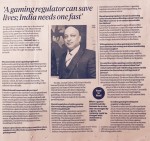 Blue Whale suicide: 'Gaming regulator can save lives; India needs one fast'
Blue Whale suicide: 'Gaming regulator can save lives; India needs one fast'
Business Standard
January 01, 1970
The government finally woke up to the threat of the Blue Whale challenge and asked internet giants such as Google and Facebook to block access to the game that has pushed many young people to suicide around the world, including in India. In the wake of this imminent threat online, Prashant Mali, a Bombay High Court lawyer and cyber policy expert, in an interview to Veer Arjun Singh explains why India needs to have a gaming regulator to filter through the dangers.
See publication
Tags: Culture, Cybersecurity, Leadership
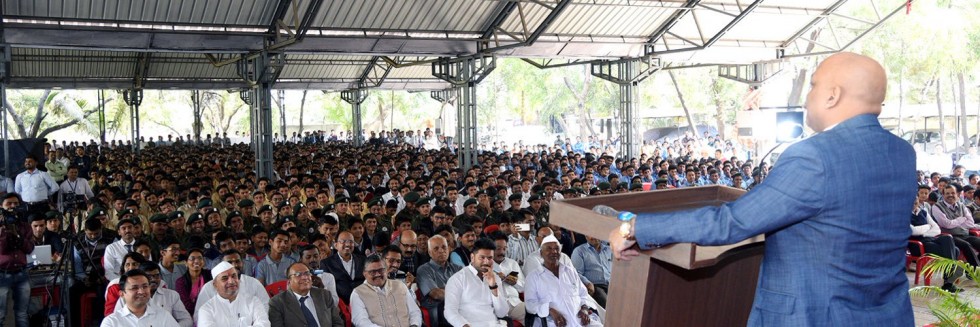

 How you can stay safe from rising ATM frauds :-
How you can stay safe from rising ATM frauds :-
 Call Details in a CDR cannot prove Location of a Criminal - Setback Case Law
Call Details in a CDR cannot prove Location of a Criminal - Setback Case Law
 How will the GDPR impact Indian organization’s ?
How will the GDPR impact Indian organization’s ?
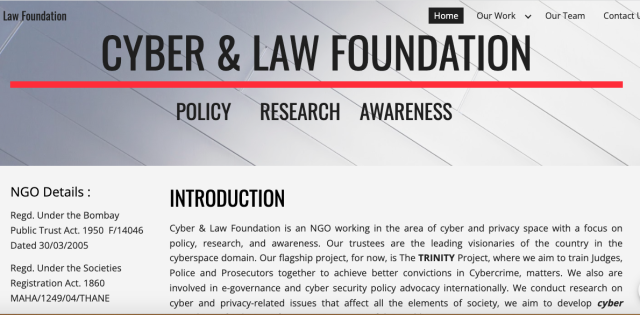 Cyber and Law Foundation
Cyber and Law Foundation
 CYBER LAW & CYBER CRIMES SIMPLIFIED
CYBER LAW & CYBER CRIMES SIMPLIFIED
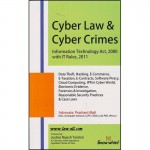 Cyber Law & Cyber Crimes- Information Technology Act, 2000 with IT Rules, 2011
Cyber Law & Cyber Crimes- Information Technology Act, 2000 with IT Rules, 2011
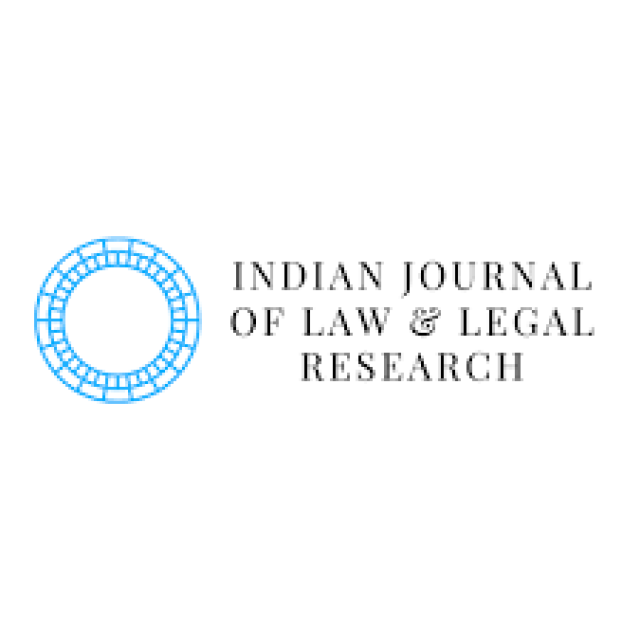 Artificial Intelligence (AI) And Copyright Law: Analysis Of Issues In International IP Laws
Artificial Intelligence (AI) And Copyright Law: Analysis Of Issues In International IP Laws
 GDPR Articles With Commentary & EU Case Laws
GDPR Articles With Commentary & EU Case Laws
 Cyber Law Consulting (Advocates & Attorneys)
Cyber Law Consulting (Advocates & Attorneys)
 Data Protection Law Influential Leader
Data Protection Law Influential Leader
 Best Cyber and Privacy Lawyer 2022
Best Cyber and Privacy Lawyer 2022
 National Cyber Defence Award
National Cyber Defence Award
 Privacy is a cultural issue in India: Can it be handled only by enacting a data protection law
Privacy is a cultural issue in India: Can it be handled only by enacting a data protection law
 ELECTRONIC EVIDENCE UNDERSTANDING THROUGH CASE LAWS in India
ELECTRONIC EVIDENCE UNDERSTANDING THROUGH CASE LAWS in India
 Consent in privacy laws: Analysis of India’s PDPB, ECPA of USA and GDPR of EU
Consent in privacy laws: Analysis of India’s PDPB, ECPA of USA and GDPR of EU
 ANALYSIS OF SECTION 66E (Violation of Privacy in India) OF THE INFORMATION TECHNOLOGY ACT,2000
ANALYSIS OF SECTION 66E (Violation of Privacy in India) OF THE INFORMATION TECHNOLOGY ACT,2000
 DATA LOCALIZATION AND DATA PORTABILITY ANALYSED WITH INDIAN PDPB & GDPR (PRIVACY LAW)
DATA LOCALIZATION AND DATA PORTABILITY ANALYSED WITH INDIAN PDPB & GDPR (PRIVACY LAW)
 Child Pornography and its Legal Framework in India
Child Pornography and its Legal Framework in India
 Artificial Intelligence and Laws in India
Artificial Intelligence and Laws in India
 India needs Cyber Weapons and Policy
India needs Cyber Weapons and Policy
 What happens to Google-Facebook-Instagram-Twitter After Death
What happens to Google-Facebook-Instagram-Twitter After Death
 Data Protection Laws and Compliance Requirements - Analysis of Laws from Europe, Singapore and India
Data Protection Laws and Compliance Requirements - Analysis of Laws from Europe, Singapore and India
 Privacy Law: Right to be Forgotten in India
Privacy Law: Right to be Forgotten in India
 ANALYSING THE AWARENESS OF CYBER CRIME AND DESIGNING A RELEVANT FRAMEWORK WITH RESPECT TO CYBER WARFARE: AN EMPIRICAL STUDY
ANALYSING THE AWARENESS OF CYBER CRIME AND DESIGNING A RELEVANT FRAMEWORK WITH RESPECT TO CYBER WARFARE: AN EMPIRICAL STUDY
 AI and Cybersecurity
AI and Cybersecurity
 AI and Regulations in India
AI and Regulations in India
 Tackling Legal Challenges in Al- enabled Cybersecurity Landscape
Tackling Legal Challenges in Al- enabled Cybersecurity Landscape
 Generative Al and its Impact on User Privacy
Generative Al and its Impact on User Privacy

 Navigating Legal Boundaries in Digital Security: Your Rights and Responsibilities
Navigating Legal Boundaries in Digital Security: Your Rights and Responsibilities
 Interview of Famous Cyber Law Expert Adv. Prashant Mali.
Interview of Famous Cyber Law Expert Adv. Prashant Mali.
 CXO Today's Interaction With Advocate Prashant Mali
CXO Today's Interaction With Advocate Prashant Mali
 Ransom-payers are also the cause of ransomware proliferation
Ransom-payers are also the cause of ransomware proliferation
 Blue Whale suicide: 'Gaming regulator can save lives; India needs one fast'
Blue Whale suicide: 'Gaming regulator can save lives; India needs one fast'
 Is cyber risk an abyss?
Is cyber risk an abyss?
 Creating safe online space for Women and child
Creating safe online space for Women and child
 Hon. Professor
Hon. Professor
 Cyber Crime Incidents at GCC Countries
Cyber Crime Incidents at GCC Countries
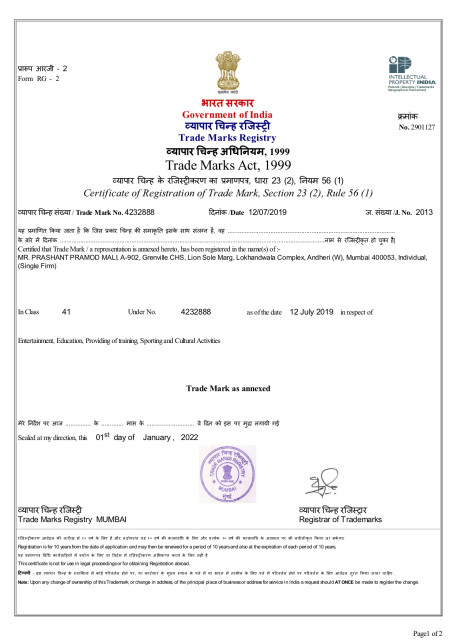 Cyber Man
Cyber Man
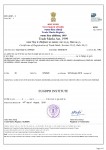 EUGDPR Institute
EUGDPR Institute